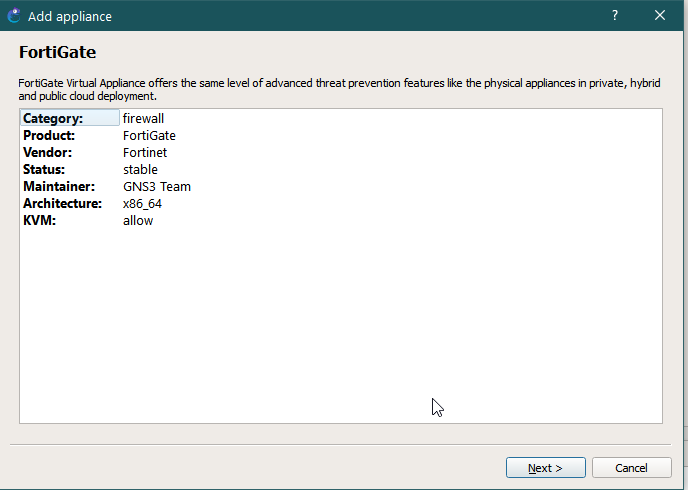Download and install Fortigate firewall image in GNS3. How to setup and deploy 'FortiOS.qcow2' in appliance GNS3. And you can do fortigate firewall training. GNS3 may be a free emulation tool, but it does not come with binary images for appliance such as that of Cisco, Palo Alto, Fortinet. Due to licensing restrictions, you or your organization needs to have a service contract agreement with the vendor. GNS3 Marketplace. One of the first place to check is the GNS3 Marketplace where you can search. FortiGate-VM08 FG-VM08, FG-VM08V FortiGate-VM ‘virtual appliance’. No VDOM by default for FG-VM08V model. FortiGate-VM16 FG-VM16, FG-VM16V FortiGate-VM ‘virtual appliance’. No VDOM by default for FG-VM016V model. FortiGate-VM32 FG-VM32, FG-VM32V FortiGate-VM ‘virtual appliance’. In the images directory we will need to find the exact software image or file that GNS3 was looking for. So you can just press 'ctrl + F' and type in the name 'FGTVM64GVM-v6-build0076-FORTINET' you should find a zip file with the name in it which you can download by clicking on the 'HTTPS' hyperlink once the file is downloaded you can extract it inside your downloads directory. Devices like Cisco (Routers, Switches, ASA, Nexus, ISE etc.), Checkpoint Firewall, Fortigate Firewall, Juniper Firewall & Router, various Windows & Linux Virtual Machines. I have also show how you can connect the devices to internet on GNS3, capture packets through Wireshark, troubleshooting techniques.
- Working EVE-NG Network Emulator
- Fortinet support account (It is free to register one)
- WinSCP
- SSH Client (Windows CMD with OpenSSH / PuTTY, etc)
How to Download and Deploy Fortigate to EVE-NG Lab
- Open your browser and go to Fortinet Support Site
- Login or Register, it is free!!!
| Login or Register, it is free!!! |

- Navigate to 'Download > VM Images'
- Select Product 'Fortigate' and Platform 'KVM'
- Click New Deployment 'Download' button
| Free Download Fortigate KVM image from Fortinet Support |
- Just wait until the download finish and move to deployment
- Extract the downloaded Fortigate KVM image, you will have
fortios.qcow2file - Run your EVE-NG (if it is not already running)
- Open WinSCP and browse your
EVE-NG server(see the picture below)
| Deploy Fortigate KVM image to EVE-NG Lab |
- Using WinSCP, on the right pane (EVE-NG server), browse to
/opt/unetlab/addons/qemu - Create New Folder with the folder name must start with
fortinet-, for example fortinet-FGT-v6-build1637 (Ref: EVE-NG Qemu image naming)
| Create New Folder with the folder name must be fortinet- |
- Open the newly created folder and upload fortios.qcow2 to the folder
- Rename fortios.qcow2 to virtioa.qcow2
| Rename fortios.qcow2 to virtioa.qcow2 by right click |
Next, fix permission using ssh client
- Open CMD from Windows 10 ('Windows+r' type 'cmd' and enter)
- Connect to your EVE-NG server using ssh command, for example:
- Enter root password, default is 'eve'
- Run this command to fix permission on EVE-NG server:
| Next, fix permission using ssh client |
| Add Fortigate node to your EVE-NG Lab |
Hello all, first i would like to thank the community for their interest in my first article about running FortiGate (FortiOS 5.6) in GNS3.
As per the many requests that i got for running FortGate with FortiOS 6 inside GNS3, this article will be about deploying FortiGate (FortiOS 6.2.3 which is currently the latest version) in GNS3. So let's get started!!
Requirements

---------------------------
- Download GNS3 2.2.5 from Here
- Download FortiGate appliance from Here
- Download FortiGate 6.2.3 Image from Here
- Deploy any VM that have a browser, in my case i deployed CentOS 7 with GUI on VMware and added it to GNS3.
---------------------------
Import Appliances & Images Older versions of garageband.
Fortigate Iso Image Download For Gns3
Start a new blank project, click File > Import Appliance, then choose the FortiGate appliance file (.gns3a)
Choose 'Run the appliance on the GNS3 VM(recommended)' option, then choose the Qemu settings and click Next. GNS3 will verify the VM requirements to run the appliance and a list of FortiGate versions should appears.
Under FortiGate 6.2.3 on the list, click on FGT_VM64_KVM-v6-build1010..., then import, then choose the file extracted from the FortiGate Image.
Fortigate Download
Note: In order for FortiGate to operate, it needs an empty harddisk
The harddisk can be created using linux tool called 'qemu-img' using the following command:
or you can download the file from Here .
To import the harddisk into GNS click on empty30G.qcow2 under FortiGate 6.2.3 on the list, then import and choose the harddisk file.
After importing the two files, FortiGate version 6.2.3 on list will indicate the status of 'Ready to install', make sure to click on the version number before clicking on next, otherwise you might get errors.
Appliance Deployment
After the installation is done, create a simple topology like the below.
Fortigate Image Download
New FortiGate VMs are configured to have DHCP enabled by default. in order to check the current IP of the FortiGate, open the console, set a new password, and type the below commands:
Then check for the 'IP' and 'allowaccess' parameters.
Fortigate Image For Gns3
In my case the IP is '192.168.101.129' and allow access is the protocols highlighted in green.
The final step is to open a browser and login to FortiGate.
Gns3 Sonicwall
and that's it, pretty simple!! let me know in case you have any comments or questions.
Gns3 Missing Files
Also let me know if you are interested in having FortiManager, FortiAnalyzer, FortiMail, FortiWeb, Forti.. in GNS3 in order to create articles for them.